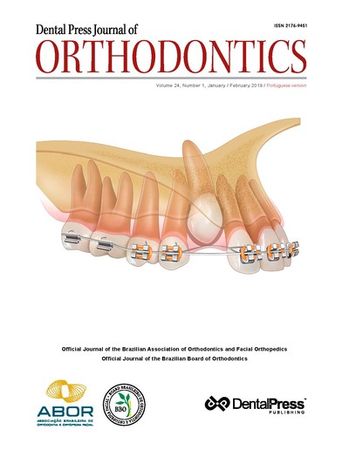
Seu carrinho está vazio!
Despite the explanations about the mechanisms and reasons why dental follicles of unerupted maxillary canines do not cause root resorption in neighboring teeth, questions remain about the time expected for this event and the lack of protocols for preventive clinical management, which may serve as insights for further studies. Here, these mechanisms are correlated with imaging findings of CT scans and 3D reconstructions of a typical clinical case.



The way in which the Internet has changed human communication is unprecedented. Its origins date from the beginning of the 1960’s, with J. C. R. Licklider, at the MIT, and his description of the Galactic Network concept. In parallel, the technology for digital data transfer was being developed independently by different researchers and, in September 1969, the first host computer was connected [to a network] at the University of California (UCLA), creating the ARPANET. Later on, in the...

It is not hard to write about Professor Garib. Daniela is one of those self-illuminated human beings, with a light that she shares with all those who approach her. It does not dazzle us, but, faced with so many virtues, where should we begin? Daniela Garib is an Associate Professor at the Hospital for Rehabilitation of Craniofacial Anomalies (HRAC) and at the Bauru Dental School (FOB), both from the University of São Paulo. In Dentistry, her first steps followed her mentor, Omar Gabriel da...

Introduction: Palatal rugae complete its development during early intrauterine life, whereas dental malocclusions in permanent dentition establishes several years into the post-natal life. Objective: The objective of present study was to determine if there is an association between the palatal rugae pattern and Angle’s classes of malocclusion. Methods: A cross-sectional study was conducted on pretreatment dental casts of 184 patients. The sample was divided into the following groups: Class...

Objective: The aim of the study was to verify and compare the accuracy of full-arch digital impressions obtained using two intraoral scanners and three scanning methodologies. Methods: A resin model created with dental 3-D printing was scanned by a reference scanner (Zfx Evolution - Zimmer Biomet, Palm Beach Gardens, FL) in order to obtain a 3D reference; the same resin model was then scanned with two different intraoral scanners (Zfx IntraScan and Carestream 3600 - CS 3600®, Carestream,...

Introduction: Proximal stripping of enamel is a routine clinical procedure employed in orthodontics to create space or for balancing tooth size discrepancies. This procedure may result in heat transfer to the pulp, predisposing it to histopathological changes and necrosis of the pulp tissue. Objective: To measure the temperature changes in the pulp chamber during different stripping procedures. Methods: 80 proximal surfaces of 40 extracted human premolar teeth were stripped using four...

Introduction: The alterations in the arch form during treatment are dictated by the dimensions of the archwires. Objective: This study aimed to determine the mean arch dimensions of a sample of Pakistani subjects and to evaluate the conformity of preformed archwires with mandibular arch form. Methods: The dental records of 1,500 adult subjects were evaluated. The mandibular casts of 42 subjects (males = females = 21) with balanced facial profile, Class I occlusion, ideal overjet and overbite...

Objective: The purpose of this study was to determine the perception of smile esthetics among orthodontists and laypersons with respect to unilateral maxillary canine torque variations in a frontal smile analysis. Methods: Full face and close-up smile photographs of two subjects (1 man and 1 woman) were used. Both smiles displayed healthy maxillary anterior dentitions. The images were digitally altered to obtain a bilateral 0° torque in the maxillary canines. From this image, unilateral...

Introduction: Aesthetic brackets are routinely combined with metallic wires in fixed orthodontic therapy, mainly due to the disadvantages of the clinical use of aesthetic archwires. The current situation needs to be explored in the literature by considering laypersons’ perceptions. Objective: The objective of this cross-sectional study was to evaluate laypersons’ aesthetic perceptions of metal archwires with and without aesthetic coating. Three age ranges and both sexes were evaluated....

Introduction: The heat treatment of stainless steel wires is a routine clinical procedure adopted by many dentists in order to relieve the stress caused after performing bends in the archwire. Objective: This study aimed to evaluate the influence of heat treatment of stainless steel archwires with a rectangular section of 0.016 x 0.022’-in. Methods: For analysis of the dimensional stability, the anterior and posterior dimensions of forty 0.016 x 0.022-in stainless steel orthodontic...

Orthodontic traction of impacted canines stands as a major challenge for Orthodontics. It is a relatively frequent clinical complaint which management, more often than not, requires a multidisciplinary approach. Surgical exposure of the impacted canine, and the complex orthodontic mechanics applied to align the tooth back into the arch, may frequently lead to complications involving supporting tissues, not to mention the long treatment time and high costs imposed to patients. In face of...

A canted occlusal plane is the cause of unaesthetic smile, and also represents a challenge, due to the complex orthodontic procedures involved in its treatment. The skeletal anchorage allows successful treatment of this asymmetry in the majority of cases, with less dependency on the patient cooperation and reducing the necessity of orthognatic surgery. Given this condition, this article aims at discussing the main aspects related to the diagnosis of occlusal plane canting, treatment plan,...

Copyright © 1998 - 2022 DentalGO | Todos Direitos Reservados. DentalGO é uma marca Dental Press